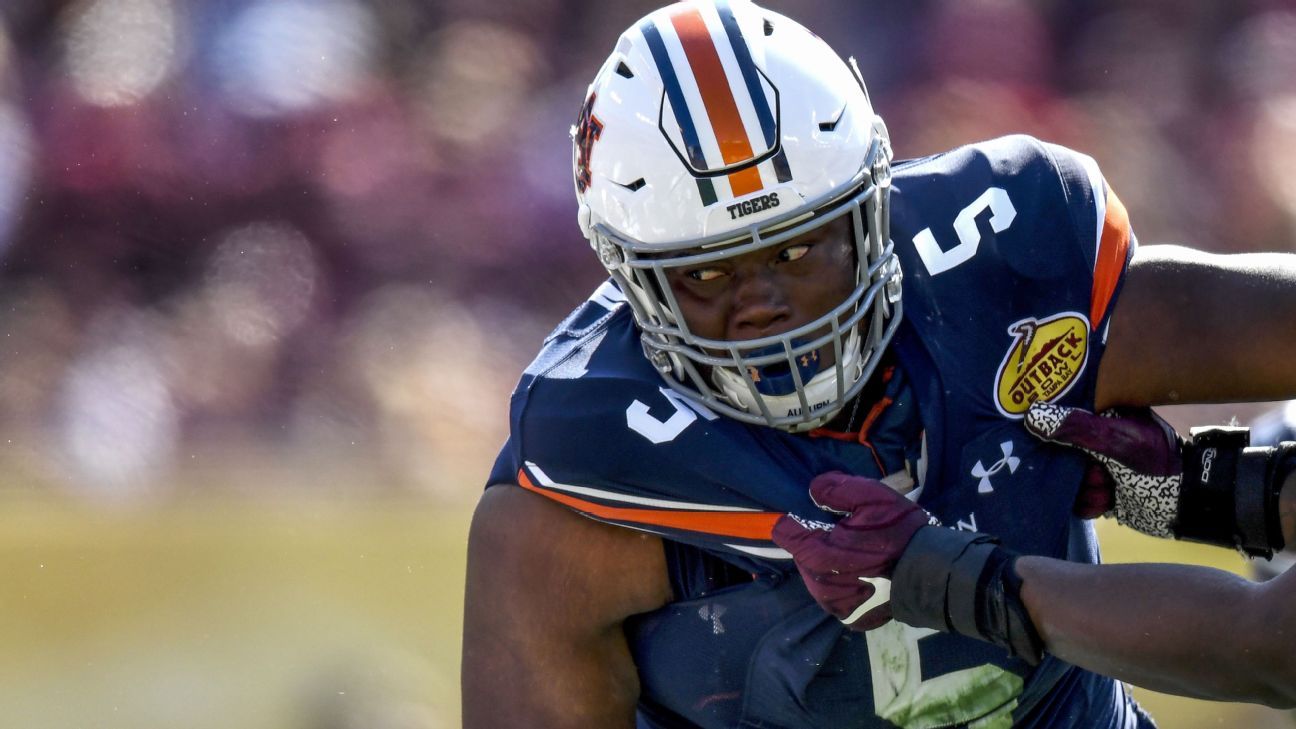CHARLOTTE, N.C. — Only once since 2014 has a rookie draft pick started all 16 games for the Carolina Panthers. Only 12 times in team history has a rookie draft pick started all 16 games, and never has more than one out of a class started the entire season.
That could change as the 2020 class of first-year NFL head coach Matt Rhule — the first in the modern era to consist of all defensive players — will be counted on heavily. The Panthers return only three defensive players who started 10 or more games for Carolina last season and only one who started all 16.
As many as five players from the draft class will be in the running to be a starter. Even in 1995, the team’s inaugural year, the Panthers had just four rookies start at least 50% of the games. Only eight Carolina rookies have started at least 50% of the games in the past seven seasons combined.
Relying on rookie starters is unusual in the modern NFL. Since 2001, two teams — the 2012 Buccaneers (who went 7-9) and 2011 Browns (4-12) — had three rookies start all 16 games, according to research by ESPN Stats & Information. The 2014 Jaguars (3-13) had seven rookies start 50% of their team’s games.
As evidenced by the above records, starting rookies is not a recipe for immediate success. As former Carolina coach Ron Rivera says, a rookie needs 5,000 snaps between the time he is drafted and the first game to be ready.
A player typically gets 90 to 120 reps a day, counting installation and practice. There’s no way any rookie will get that many reps before this season because of the coronavirus pandemic that limited the offseason to virtual training.
For example, there are only 54 days between the time Carolina rookies are scheduled to report on Tuesday and the start of the season on Sept. 13, and that assumes there are no delays or setbacks. Veterans aren’t scheduled to report until July 28, so time with the full team is reduced to 47 days. With mandatory days off, that shrinks the number closer to 40. Even at the maximum 120 reps a day, that’s 4,800 estimated reps.
However, because the Panthers are in a rebuilding mode and the defense was decimated by the early retirement of middle linebacker Luke Kuechly — in addition to the decision to move on from seven veterans who started last season — the opportunities to make an immediate impact are there.
A breakdown of which Carolina rookies are poised to make the biggest impact this season:
Derrick Brown, DT, Auburn, first round: Barring injury, Brown should start every game next to two-time Pro Bowl tackle Kawann Short, who was sidelined all of last season with a shoulder injury. Brown, the No. 7 overall pick, was a dominant run-stopper in college with the potential to create havoc on the pass rush if Short draws a lot of double-teams. His profile is similar to 2013 first-round pick Star Lotulelei, who started 16 games as a rookie.
Yetur Gross-Matos, DE, Penn State, second round: The decision to move on from Mario Addison, Bruce Irvin and Vernon Butler puts Gross-Matos in the picture for significant starting time behind free-agent acquisition Stephen Weatherly and 2019 first-round pick Brian Burns as Carolina makes a transition back to a four-man front. Gross-Matos is closer to a classic 4-3 end at 6-foot-5 and 265 pounds than Burns (6-5, 250), who was drafted for his speed as the team changed to a 3-4 base front in 2019. Gross-Matos might not start initially, but don’t be surprised if that changes with experience.
Jeremy Chinn, S, Southern Illinois, second round: Carolina traded up to get Chinn, so expectations are high. Experience makes free-agent acquisition Juston Burris the likely starter opposite Tre Boston heading into camp, but Chinn is that “positionless player” Rhule loves. He can play deep or in the box. He easily could fall into the category of starting 75% of the time.
Troy Pride Jr., CB, Notre Dame, fourth round: Veteran Eli Apple was signed to fill one corner spot, but the other could be up for grabs. Donte Jackson went from starting 16 games as a rookie in 2018 to 10 last season because of inconsistent play. Pride’s profile is a lot like 2012 fifth-round pick Josh Norman, who started 12 games as a rookie. He has decent size (5-11, 195), elite speed and the attitude needed to play corner in the NFC South against Julio Jones, Michael Thomas and Mike Evans.
Kenny Robinson, S, West Virginia, fifth round: Chinn’s presence will make it tough for Robinson to start or get significant playing time — unless the Panthers opt to let Chinn play more of an outside linebacker role. Chinn has drawn comparisons to Clemson Isaiah Simmons, the eighth overall pick. But Robinson has some pro experience, having spent a part of this spring with the XFL’s St. Louis Battlehawks before the coronavirus pandemic shut down the country. Pro Football Focus called him one of the biggest steals of the draft.
Bravvion Roy, DT, Baylor, sixth round: He loves being reunited with Rhule, who brought him to Baylor. He understands the “process’’ Rhule talks about as necessary to turn a program around. Rhule loves what Roy can bring to the middle of Carolina’s front, so look for the 6-1, 332-pound tackle to at least be a significant part of the rotation behind Brown and Short.
Stantley Thomas-Oliver III, CB, Florida International, seventh round: He’s more of a developmental player, so don’t look for starting time or much playing time. He was a former wide receiver at FIU.
